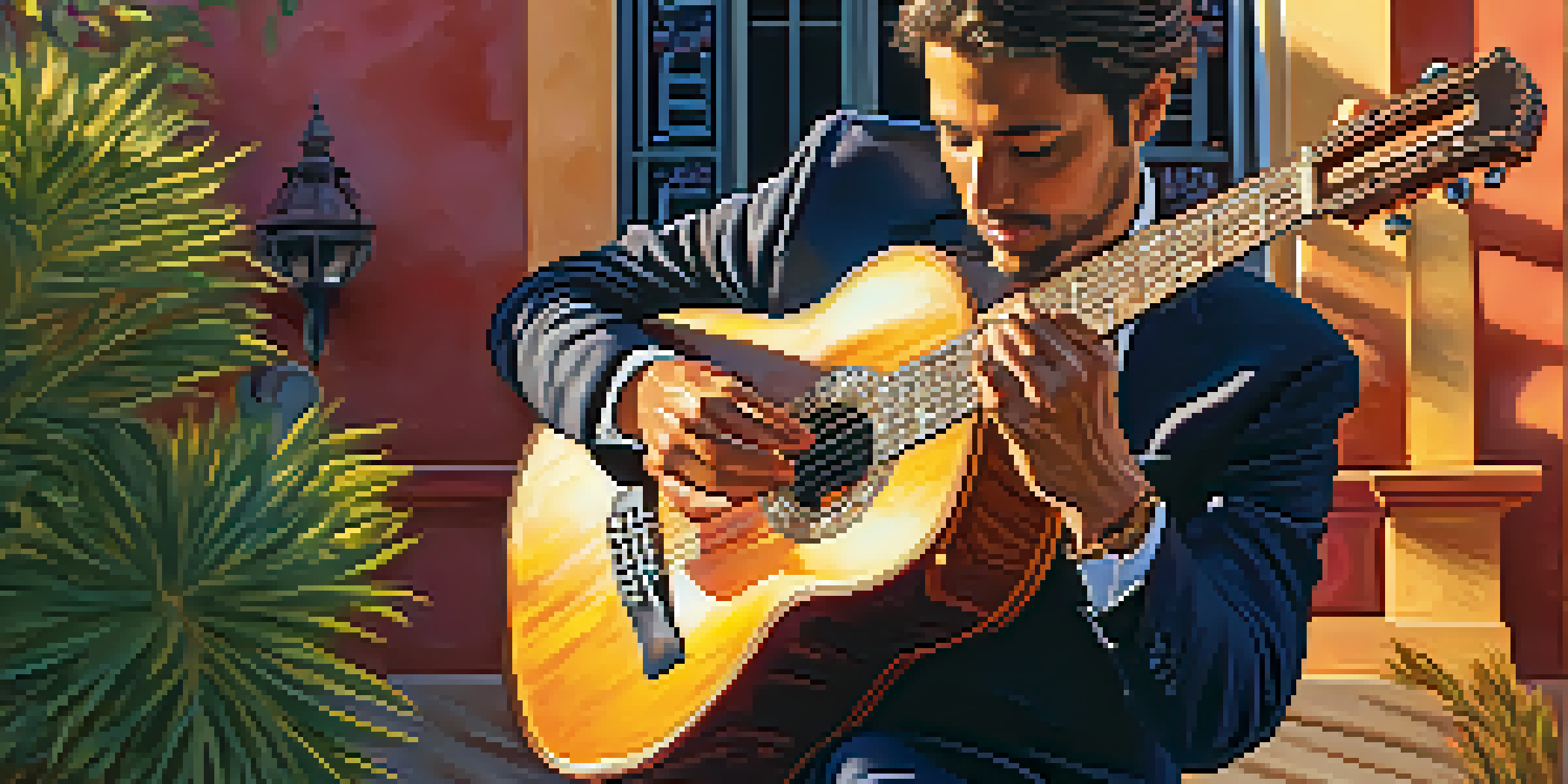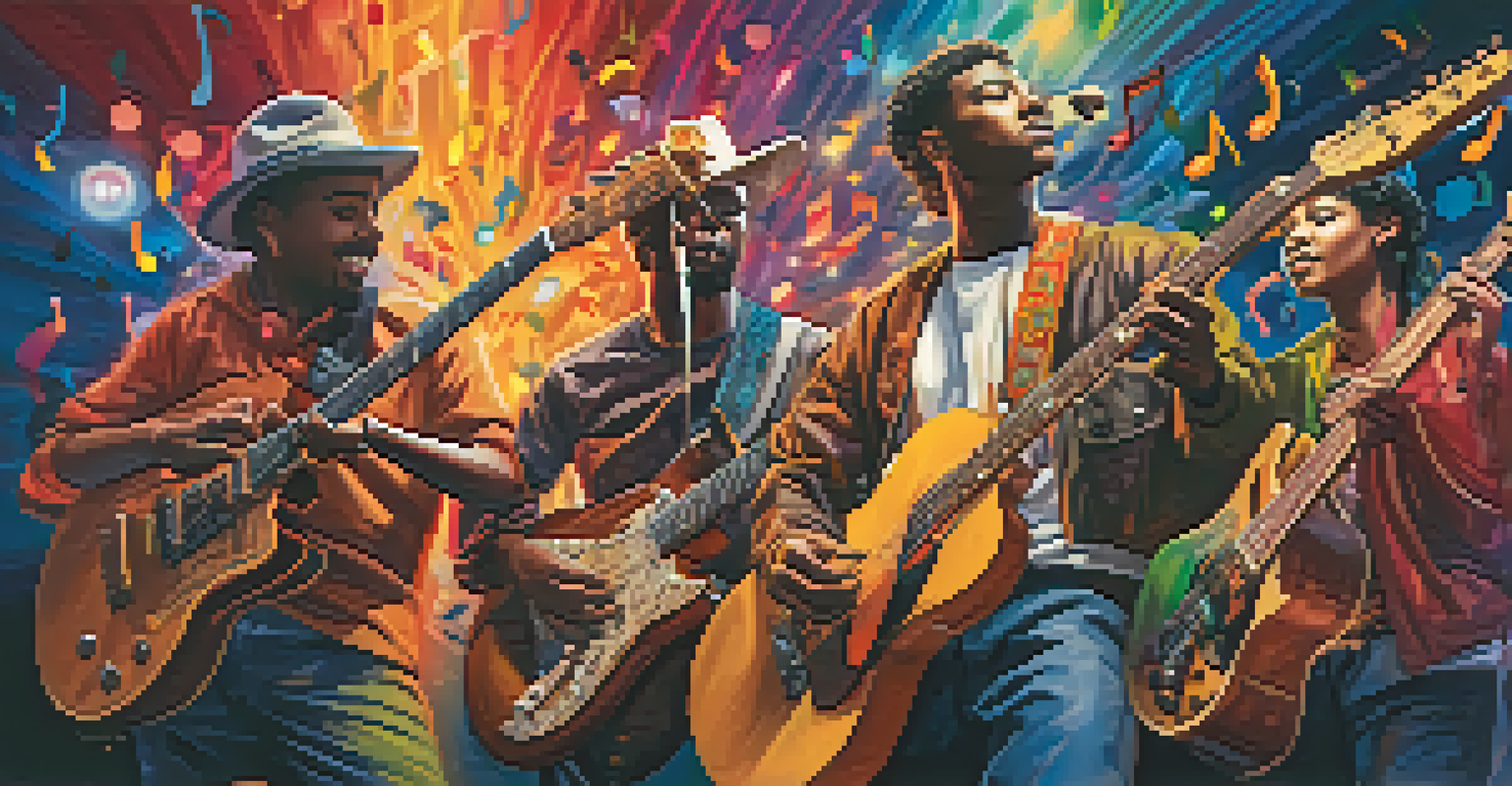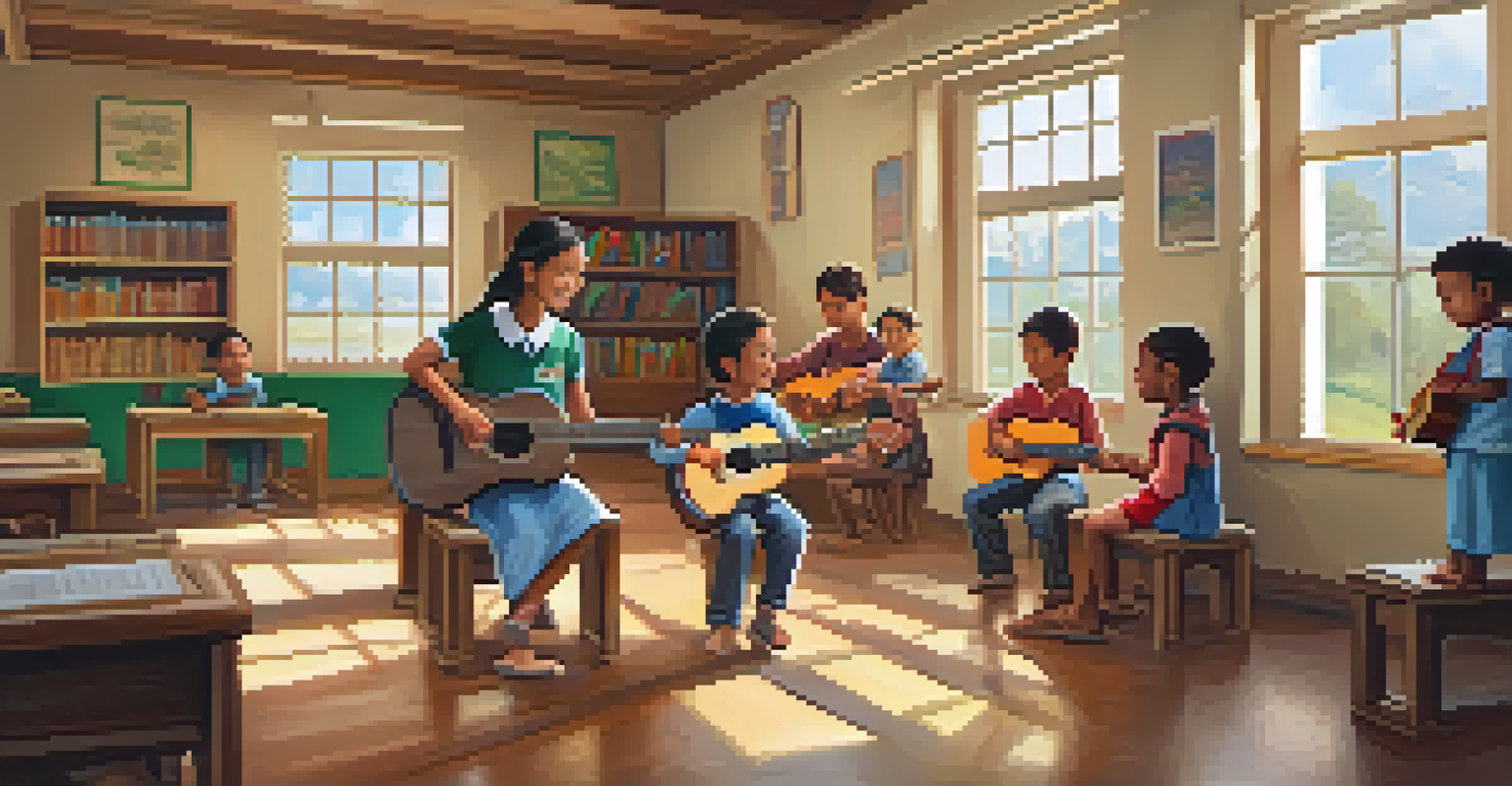Guitar as a Tool for Cultural Preservation and Storytelling

The Guitar: A Symbol of Cultural Identity
The guitar has long been more than just a musical instrument; it's a powerful symbol of cultural identity. From the flamenco guitars of Spain to the acoustic strums of American folk music, each variation tells a story unique to its culture. Through its strings, communities express their values, traditions, and experiences, creating a rich tapestry of sound that reflects their heritage.
Music is the shorthand of emotion.
When people hear a specific guitar riff or melody, it often evokes memories tied to their cultural roots. For example, the distinctive sound of a Brazilian bossa nova can instantly transport listeners to sun-soaked beaches, while the twang of a country guitar might conjure images of open fields and rural life. This emotional connection can help preserve cultural narratives across generations.
Moreover, as musicians blend styles and influences, the guitar becomes a medium for cultural exchange. This fusion not only keeps traditional sounds alive but also encourages the evolution of new musical narratives that honor the past while embracing the future.
Guitar Music as Oral Tradition
Oral traditions are vital for the preservation of stories and histories, and guitar music plays a crucial role in this process. In many cultures, songs passed down through the generations carry tales of love, loss, and heritage. These narratives are often embedded in the music itself, allowing listeners to connect with their ancestors and understand their journeys.

For instance, the blues genre originated from African American communities, reflecting their struggles and resilience through poignant lyrics and soulful guitar riffs. Each performance is a retelling of the past, breathing life into the stories that shaped their identity. This oral storytelling through music ensures that important cultural narratives are not forgotten over time.
Guitar as a Cultural Identity Tool
The guitar serves as a powerful symbol of cultural identity, allowing communities to express their unique stories and traditions.
In this way, the guitar acts as a bridge between generations. Older musicians pass down their knowledge and stories to younger players, fostering a sense of community and continuity that is vital for cultural preservation.
The Role of the Guitar in Social Movements
Throughout history, the guitar has been a powerful tool in social movements, amplifying voices that seek change. From protest songs of the 1960s to contemporary anthems for justice, the guitar's rhythmic and melodic capabilities have inspired countless individuals to unite for a common cause. These songs often encapsulate the struggles and aspirations of communities, serving as rallying cries for those who seek social change.
The guitar is a miniature orchestra in itself.
For example, during the civil rights movement in the United States, musicians used their guitars to spread messages of hope and resilience. Songs like 'We Shall Overcome' became synonymous with the fight for equality, illustrating how music can galvanize people and foster solidarity. The emotional weight of guitar-led anthems often resonates deeply, making them memorable and impactful.
As new issues arise, artists continue to use the guitar to address societal challenges, ensuring that the stories of marginalized communities are heard. This ongoing narrative not only preserves the past but also chart new paths toward justice and equality.
Cross-Cultural Collaborations through Guitar
One of the most beautiful aspects of the guitar is its ability to foster cross-cultural collaborations. Musicians from diverse backgrounds often come together to create unique sounds that blend their respective traditions. This musical fusion not only enriches the artists' repertoires but also allows them to share their cultural stories with a broader audience.
For example, the collaboration between flamenco guitarists and jazz musicians has led to the birth of new genres like 'flamenco jazz,' showcasing how different styles can coexist and create something innovative. These collaborations often result in performances that are both entertaining and educational, inviting audiences to appreciate the nuances of different cultures.
Music as Oral Tradition
Guitar music plays a crucial role in preserving oral histories, connecting generations through shared narratives of love, loss, and heritage.
Additionally, such partnerships can help dispel stereotypes and promote cultural understanding. By showcasing the beauty of diverse musical heritages, guitar collaborations build bridges between communities, encouraging dialogue and connection.
The Guitar in Contemporary Storytelling
In today’s digital age, the guitar continues to play a vital role in contemporary storytelling. Musicians leverage platforms like YouTube and social media to share their narratives, often using the guitar as their primary storytelling medium. This accessibility allows stories from various cultures to reach global audiences, amplifying voices that might otherwise remain unheard.
Artists like Ed Sheeran and Jason Mraz have popularized personal storytelling through their guitar-driven songs, weaving anecdotes and emotions into their lyrics. These modern tales resonate with listeners, providing a sense of connection and shared human experience. The guitar thus becomes a vessel for storytelling that transcends geographical boundaries.
Moreover, emerging artists are increasingly blending traditional sounds with modern influences, creating a rich dialogue between past and present. This evolution ensures that cultural narratives remain dynamic and relevant, continually engaging audiences and preserving their heritage.
Educational Initiatives Using Guitar for Cultural Learning
Educational programs that incorporate the guitar as a teaching tool are crucial for cultural preservation. By introducing students to different musical styles and their histories, these initiatives foster appreciation for diverse cultures. Learning to play the guitar can also instill a sense of pride in one's heritage, as students explore the stories and traditions behind the music.
Many schools and community centers offer guitar classes that focus on traditional music from various cultures. These programs not only teach technical skills but also emphasize the importance of the narratives embedded within the songs. For example, students might learn traditional Native American songs while discussing their historical context and significance.
Guitar in Social Movements
Throughout history, the guitar has amplified voices in social movements, serving as a rallying cry for justice and change.
By encouraging young people to embrace guitar music from different cultures, we help create a new generation of musicians who value storytelling through music. This engagement not only preserves cultural narratives but also nurtures creativity and community.
The Future of Guitar and Cultural Storytelling
As we look to the future, the guitar will undoubtedly continue to be a powerful tool for cultural storytelling. Technological advancements, such as digital recording and online platforms, provide musicians with unprecedented opportunities to share their narratives far and wide. This evolution means that cultural stories can reach a global audience, fostering greater understanding and appreciation for diversity.
Moreover, the rise of virtual collaborations allows artists from different parts of the world to create music together, transcending limitations of geography and time. This interconnectedness can result in innovative sounds that celebrate cultural diversity while preserving traditional elements.

Ultimately, the guitar will remain a vital instrument for storytelling, bridging gaps between cultures and generations. Its strings will continue to resonate with the stories of humanity, ensuring that our collective narratives are not only preserved but also celebrated.